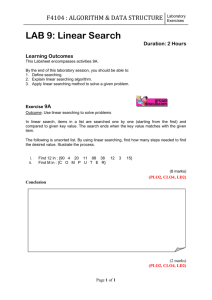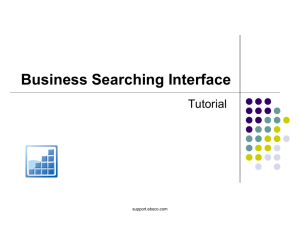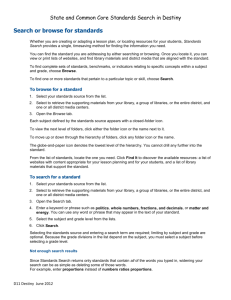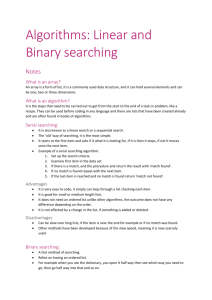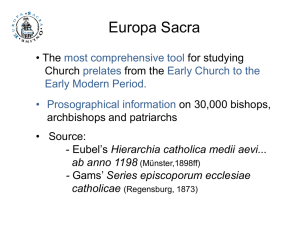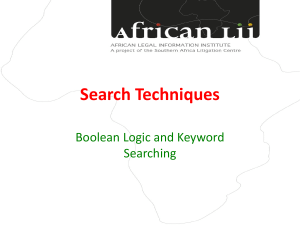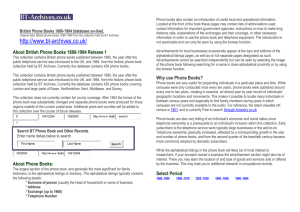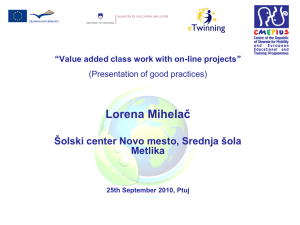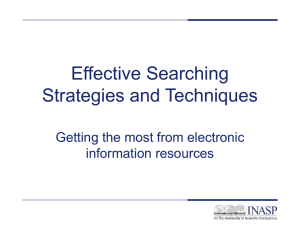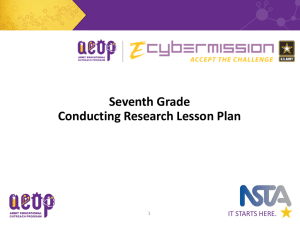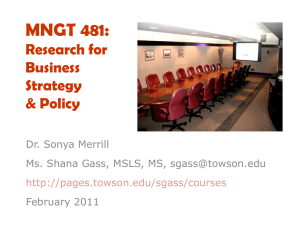Scholarly Communication: the Challenge and Impact of Open
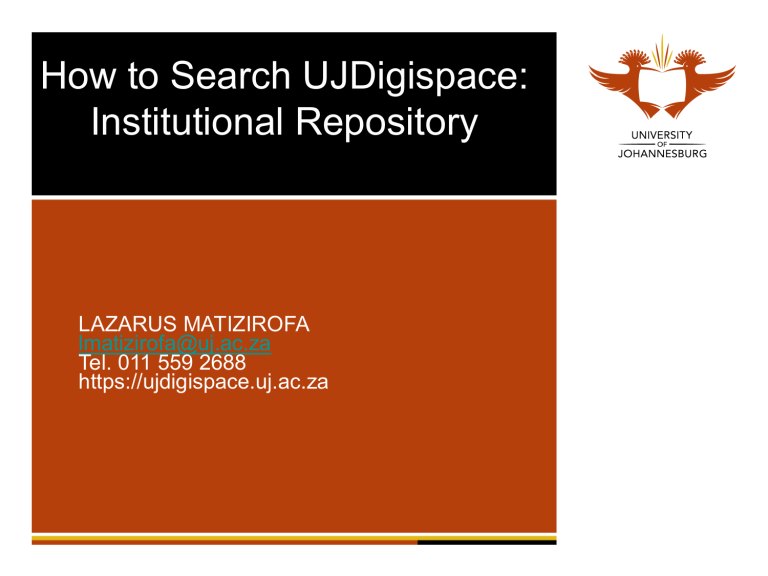
How to Search UJDigispace:
Institutional Repository
LAZARUS MATIZIROFA lmatizirofa@uj.ac.za
Tel. 011 559 2688 https://ujdigispace.uj.ac.za
WHAT IS UJDIGISPACE?
The University of Johannesburg’s
Institutional Repository is an open access hub that showcases the research output of the University, making it available to the public in a searchable, browse-able and discoverable database
New items are being added all the time, if not daily
DEFINITION OF OPEN ACCESS
Open access (OA) means unrestricted online access to peer-reviewed scholarly research
Open access (OA) publishing: It proposes a new business model for academic publishing that enables immediate, worldwide open access to the full text of research articles for the best interests of scientific community. For authors, OA can be achieved in two primary methods:
Publishing articles in open access journals (OAJ)
Depositing copies of articles in open access archives (OAA) or repositories through self-archiving or institutional archiving
WHERE TO FIND UJDIGISPACE
UJDigispace is integrated to many public access platforms available over the Internet
All search engines
Open access directories and gateways, incl. NRF ETDs’ portal
UJ Library
Listed under library databases
UJ & UJLibrary websites
UJoogle
UJDIGSPACE INTEGRATION & INTEROPEBILITY
South African Theses & Dissertations http://www.netd.ac.za/
Networked Digital Library of Theses and Dissertations (NDLTD) http://www.ndltd.org/home ;
Bielefeld Academic Searchhttp://www.base-search.net
;
Registry of Open Access Repositories: http://roar.eprints.org/ ;
The Directory of Open Access
Repositories – OpenDOAR: http://www.opendoar.org/
COLLECTION CONTENT
Eligible Research Output Types
Peer-reviewed journal articles
Peer-reviewed conference proceedings
Inaugural lectures
Books
Chapters in books
Scholarly artworks & designs
Non-traditional Research Output Types
Original creative works
Recorded creative works
Curated public exhibitions and events
Future thrust
Research data (conceptualisation stage)
UJDIGISPACE HOMEPAGE
HOW TO REGISTER & LOG IN
User can directly register through a log-in or may access without personal credentials
You may sign on to the system if you:
wish to subscribe to a collection and receive e-mail updates when new items are added
Need access item statistics
Unregistered users have access to UJDigispace resources accept for alerts & access to item statistics
8
THESES & DISSERTATIONS
The ETD collection is growing fast
Born digital – since 2011
Retrospective digitisation projects
Thesis collections are arranged by departments
At present the total is [7739] and is increasing every week
The ETD Submission workflow is now 100% compliant to all parties students, faculties & the IR
JOURNAL & CONFERENCE PAPERS
Objective of the IR is to harvest the entire research output of the university, and expose on the Internet, for visibility and to a wider readership
These collections are arranged by faculty
UJ has adopted two open access models:
Gold OA – articles published in OA journals, no charge to the reader should be archived
Green OA – Preprints & Accepted author manuscripts (AAM) should be archived
IR is trying its best to get by-in from UJ authors to deposit their research output
HOW TO SEARCH UJDigispace
Browse by Community/Collection takes you through the communities in alphabetical order and allows you to see the sub-communities and collections within each community
Can browse the entire database, and also as follows:
Browse by Title allows you to move through an alphabetical list of all titles of items
Browse by Author allows you to move through an alphabetical list of all authors of items
Browse by Subject allows you to move through an alphabetical list of subjects assigned to items
Browse by Date allows you to move through a list of items in UJDigispace (not so accurate at present – i.e., ETDs)
SEARCH BOX
To search all of UJDigispace, use the search box at the top of the navigation bar on the left (or the search box in the middle of the home page)
SEARCHING…
DSpace uses the Jakarta Lucene search engine. Here are some search hints:
What is searched in the general keyword search?
The word(s) you enter in the search box will be searched against the title, author, subject abstract, and identifier fields etc… of each item's record.
UJDigispace site is enabled for full-text searching, the text you entered will also be searched against the full text of all archived documents. For more information on full-text searching please contact your DSpace Administrator.
What is not searched - Stop Words
The search engine ignores certain words that occur frequently in English, but do not add value to the search. These are: "a", "and" , "are" , "as" , "at" , "be" , "but"
, "by" , "for" , "if" , "in" , "into", "is" ,"it" ,"no" , "not" , "of" , "on" , "or" , "such", "the" ,
"to" , "was"
SEARCHING…
Truncation: Use an asterisk (*) after a word stem to get all hits having words starting with that root, for example: will retrieve selects, selector, selectman, selecting...
Stemming : The search engine automatically expands words with common endings to include plurals, past tenses, etc…
Phrase Searching: To search using multiple words as a phrase, put quotation marks (") around the phrase
Exact word match: Put a plus (+) sign before a word if it MUST appear in the search result. For instance, in the following search the word "training" is optional, but the word "dog" must be in the result...
Eliminate items with unwanted words: Put a minus (-) sign before a word if it should not appear in the search results. Alternatively, you can use NOT. This can limit your search to eliminate unwanted hits. For instance, in the search or or you will get items containing the word "training", except those that also contain the word "cat"
BOOLEAN SEARCHING
The following Boolean operators can be used to combine terms. Note that they must be CAPITALIZED !
AND - to limit searches to find items containing all words or phrases combined with this operator, e.g. will retrieve all items that contain BOTH the words
"cats" and "dogs".
OR - to enlarge searches to find items containing any of the words or phrases surrounding this operator will retrieve all items that contain EITHER the words "cats" or "dogs".
NOT - to exclude items containing the word following this operator, e.g. will retrieve all items that contain the word "training" EXCEPT those also containing the word "cat".
Parentheses can be used in the search query to group search terms into sets, and operators can then be applied to the whole set, e.g.
ADVANCED SEARCH
The advanced search page allows you to specify the fields you wish to search, and to combine these searches with the
Boolean " and ", " or " or " not "
You can restrict your search to a community by clicking on the arrow to the right of the top box. If you want your search to encompass all of UJDigispace, leave that box in the default position
Then select the field to search in the left hand column and enter the word or phrase you are searching in the right hand column. You can select the Boolean operator to combine searches by clicking on the arrow to the right of the " AND " box.
SUBJECT CATEGORY SEARCH
A controlled vocabulary is a set in
UJDigispace based on descriptions of particular types of content or subject matter. This aids searching by increasing the likelihood that the relevant materials will be returned by the user's search
GLOBAL TRAFFIC TO UJDIGISPACE –
FROM 2010 TO 15/04/2014
Footer 18
FOR FURTHER ASSISTANCE...
For help how to search UJDigispace and questions about your specific search, please contact us @ ujdigspace@uj.ac.za
For general information call us @ ext. 2688 or 3374
